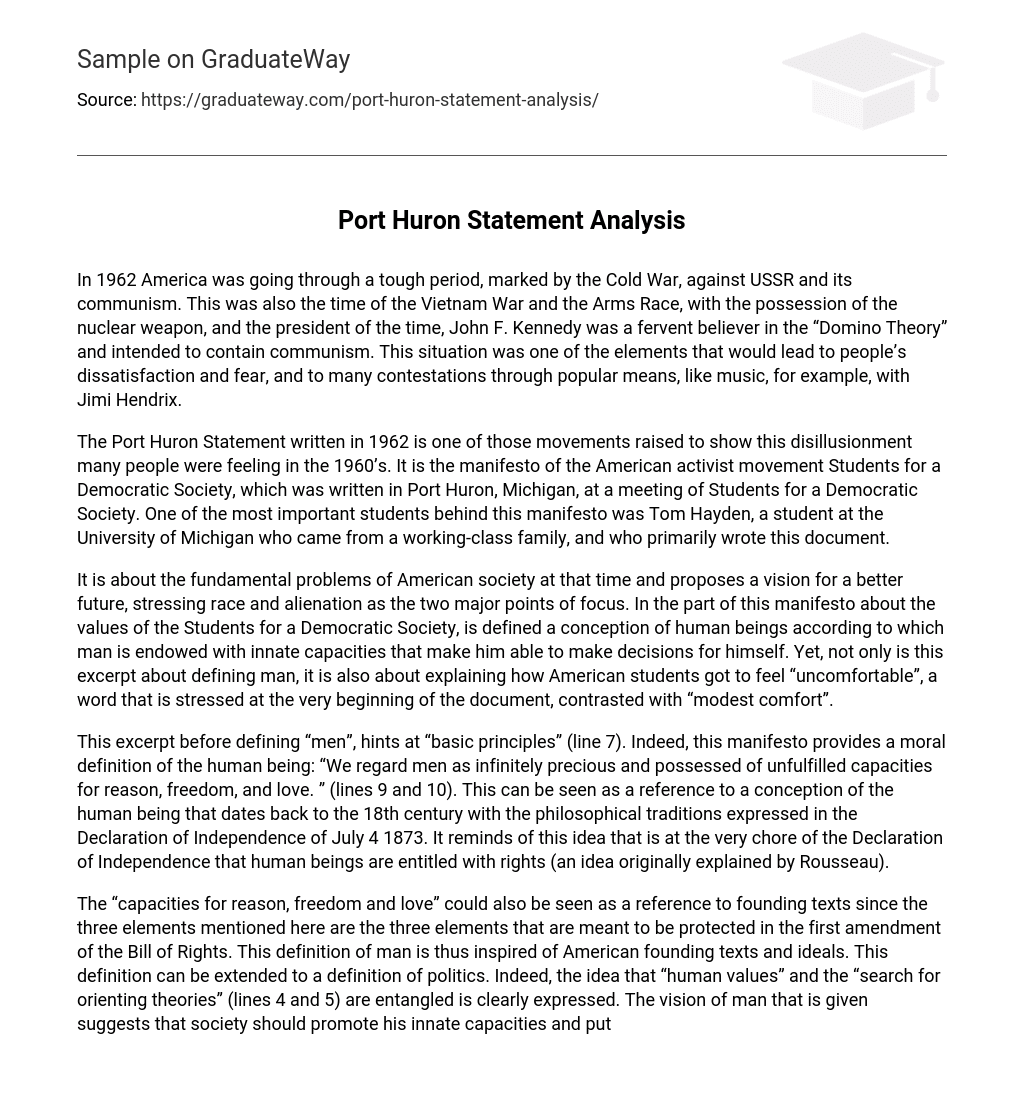In 1962 America was going through a tough period, marked by the Cold War, against USSR and its communism. This was also the time of the Vietnam War and the Arms Race, with the possession of the nuclear weapon, and the president of the time, John F. Kennedy was a fervent believer in the “Domino Theory” and intended to contain communism. This situation was one of the elements that would lead to people’s dissatisfaction and fear, and to many contestations through popular means, like music, for example, with Jimi Hendrix.
The Port Huron Statement written in 1962 is one of those movements raised to show this disillusionment many people were feeling in the 1960’s. It is the manifesto of the American activist movement Students for a Democratic Society, which was written in Port Huron, Michigan, at a meeting of Students for a Democratic Society. One of the most important students behind this manifesto was Tom Hayden, a student at the University of Michigan who came from a working-class family, and who primarily wrote this document.
It is about the fundamental problems of American society at that time and proposes a vision for a better future, stressing race and alienation as the two major points of focus. In the part of this manifesto about the values of the Students for a Democratic Society, is defined a conception of human beings according to which man is endowed with innate capacities that make him able to make decisions for himself. Yet, not only is this excerpt about defining man, it is also about explaining how American students got to feel “uncomfortable”, a word that is stressed at the very beginning of the document, contrasted with “modest comfort”.
This excerpt before defining “men”, hints at “basic principles” (line 7). Indeed, this manifesto provides a moral definition of the human being: “We regard men as infinitely precious and possessed of unfulfilled capacities for reason, freedom, and love. ” (lines 9 and 10). This can be seen as a reference to a conception of the human being that dates back to the 18th century with the philosophical traditions expressed in the Declaration of Independence of July 4 1873. It reminds of this idea that is at the very chore of the Declaration of Independence that human beings are entitled with rights (an idea originally explained by Rousseau).
The “capacities for reason, freedom and love” could also be seen as a reference to founding texts since the three elements mentioned here are the three elements that are meant to be protected in the first amendment of the Bill of Rights. This definition of man is thus inspired of American founding texts and ideals. This definition can be extended to a definition of politics. Indeed, the idea that “human values” and the “search for orienting theories” (lines 4 and 5) are entangled is clearly expressed. The vision of man that is given suggests that society should promote his innate capacities and put them at the chore of political decisions.
Participation in decision-making” (line19) conjures up the idea of a Participatory Democracy, which was a major theme for elements of the American Left in the 1960’s. This implies a more important influence of the people in the decisions of their society. In this respect this excerpt gives a moral definition of man that influences a conception of politics, referring to American founding ideals. This can be seen as way of giving credibility to the denunciation and heavy criticism that is also observable in this text. Indeed, these values pave the way for an explanation of the discomfort the Students for a Democratic Society express.
The brutalities of the twentieth century” (line 14) are mentioned, referring to many upheavals of the century that changed the mentalities and lead the people to feel insecure; the Second World War and its genocide, revealing how dangerous a Government can be, the Cold War, with the Arms Race and the fear around the nuclear bomb had huge consequences over the population. The Vietnam War lead people to disappointment and bitterness, because the way young people were sent to fight in a very critical situation revealed the Government and its political convictions were more important than anything else.
These references that explain the feeling of discomfort do not only hint at History but also brings about a heavy criticism of the Government of the time. This criticism is very noticeable in this excerpt because the definition of men that is given by the Students for a Democratic Society is contrasted with the vision of men Government had at that time. This vision of man they oppose to is referred to as “the doctrine of incompetence” (line 16) which “rests essentially on the modern fact that men have been “competently” manipulated into incompetence” (line 16).
This explains their idea that the society they lived in was no longer democratic, and refers to their firm opposition to the policies of the time, especially about economy and the oppression and disenfranchisement of Black Americans. They felt that democracy had gone because of the domination of Congress by southern segregationists who blocked progress in the efforts to dismantle the machinery of Southern segregation. This definition of values brings about the “problems which are troubling and unresolved” (line28).
All these elements referring to historical events of the twentieth century and policies of the United States in the 1960’s give to this excerpt another aspect. Beyond its moral description of man is brought a very important denunciation of the Government of the time and provides an explanation for the prevailing feeling of fear and disillusionment many people felt in the 1960’s. This had a huge impact. It helped for instance passing the landmark Voting Rights Act of 1965. Fifty years after its creation, it still influences and inspires many people today.





